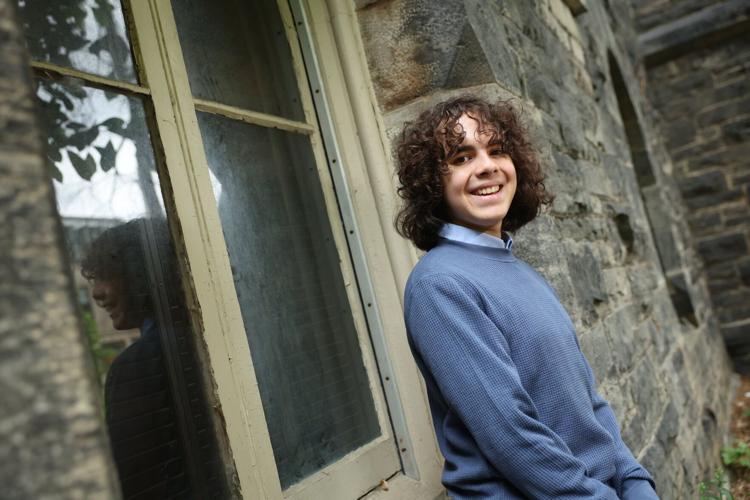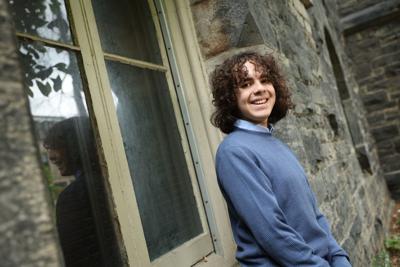Among the many students walking across the stage at University of É«É«Ŕ˛’s convocation ceremonies this month will be the university’s youngest graduate since at least 1979.
“It’s an honour to be graduating now,” said 16-year-old Daniel Honciuc Menendez. At the end of this month, he’ll graduate from U of T’s University College with a specialist in physics and a major in mathematics with high distinction.
Menendez started at U of T four years ago at age 12 — although he spent his first year attending classes remotely from his home in Ecuador due to the ongoing COVID-19 pandemic.
“Even though I was still able to talk to my classmates online — we had a Discord chat, we also had Instagram and Facebook Messenger chats — the experience wasn’t really complete,” he said of his first year.
In fall 2021, Menendez was finally able to travel to É«É«Ŕ˛ with his mom with the return of in-person classes. He said his first in-person class, a practical physics lab session, is one of his favourite memories of his degree.
“It sounds a little bit cliche,” he said. “I loved how finally I could go interact with my professors, my classmates.”
An enduring love of physics (and É«É«Ŕ˛)Â
Growing up, Menendez loved to read. In an interview with U of T’s media team, Menendez pointed to this as well as his interest in educational videos as the source of his passion for science.
Menendez moved around a lot when he was younger due to his mom’s job as an electrical engineer. He started school in the U.K., skipping a grade, before returning to Ecuador where he skipped more grades while participating in advanced course programs like International Baccalaureate and Johns Hopkins University Centre for Talented Youth.
A year before he started studying at U of T, then-11-year-old Menendez spent a summer at the Perimeter Institute for Theoretical Physics in Waterloo — a centre focused on research, training and outreach — in the Institute’s International Summer School for Young Physicists program for high schoolers interested in physics.
He said this summer program not only cemented his passion in high-energy physics and quantum technology, but also led him to consider U of T as an option.
“I also had an opportunity to go to É«É«Ŕ˛ and also visit U of T, and I really loved the campus,” he said. “It’s a big university and there’s a lot that you can do as a student.”
When it comes to physics and quantum technology, Menendez said he loves the interdisciplinary applications of both fields of study.
“What (quantum technology) allows us to do is to be able to solve all problems that were not possible for computing. For example, simulations of molecules which have applications to help discovery in the area of medicine.”
Once at U of T, Menendez continued to explore these passions through his course and research work with professors.
One such professor, Dr. Miriam Diamond from the Department of Physics, recalls working with Menendez fondly. Menendez worked with Diamond on her Super Cryogenic Dark Matter Search (CDMS) experiment at  as part of a fourth-year research project.
“He was very eager to learn not just what he needed to know to complete this particular project, but a lot about the field in general,” Diamond said, adding that Menendez’s writing and oral presentation were “some of the best” she has ever seen from an undergraduate student.
Diamond also said she always looked forward to her weekly meetings with Menendez because “his cheer is definitely contagious.”
“On the one hand, he’s very much mature beyond his years. At the same time, though, he still has a childlike wonder and enthusiasm about him, which a lot of us in the field have somewhat lost,” she said. “So in a way, I’m sort of hoping he never entirely grows up and he maintains that enthusiasm.”
From physics to karaoke
Menendez said he felt “pretty integrated” into the U of T community over the past few years, noting that his age never felt like a debilitating factor in his ability to make friends — whether they be fellow university students or people his age — and talk to professors.
“I’m just another one of the other students,” he said.
Like other students, he found ways to get involved on campus outside of the classroom, including playing violin in the Hart House Chamber Strings ensemble and serving as the vice president of academic affairs of the Physics Student Union in his fourth year. And, outside of school, Menendez said he likes to watch movies and TV with friends and go to karaoke (his go-tos are Latin rock songs).
Menendez recognizes that he hasn’t had “the normal teenager experience,” but said, “This is my teenager experience ... and it’s been amazing for me so far.”
Still, Menendez said his time at U of T has not always been easy, noting that he had to be his own advocate to access services and supports. Diamond also noted that his status as an international student created some barriers to job programs or opportunities.
What’s next?
After he crosses the convocation stage at the end of the month, Menendez said he plans to start his master’s degree in physics. The two-year program — funded by a full scholarship from the European Union — will take place at Sapienza University of Rome, UniversitĂ© Paris-Saclay for the first two semesters and U of T for the final two.
He said he plans on pursuing a PhD in physics after his master’s, along with working on a startup in the quantum computing industry in the future.
Menendez also said he hopes to continue his outreach work to promote studying and working in STEM (he previously worked with a program in Ecuador for kids 5–12 years old and currently serves as the Ecuador ambassador for the Girls in Quantum organization).
“It’s not just also about teaching the kids, but also mentoring the kids and what they’re interested in,” he said. “You’ve got to find a way to guide them through their interests, see what they want to do in the future.”
As he prepares to leave U of T, Menendez said he was thankful to everyone who has supported him — from his high school in Ecuador to his peers and mentors at U of T.
“It’s not ‘Thank you for letting me be the youngest one to graduate.’ It’s ‘Thank you for supporting me during the journey that I’ve been on.’”
He also said he could not have graduated without having his mother with him.
“She’s also really been my emotional support through all this, and has really taught me the value of hard work,” he said.
Liliana Menendez said she was proud of her son.
“Daniel is a fantastic boy,” she said. ”I am really proud because, like Daniel said, he had challenge for not going (to university) for a traditional age.”
Correction — June, 10, 2024
This story has been updated. A previous version incorrectly stated professor Miriam Diamond works in the department of Earth Sciences at U of T. She works in the department of Physics.





























To join the conversation set a first and last name in your user profile.
Sign in or register for free to join the Conversation